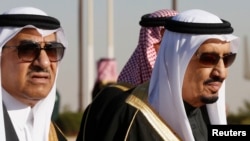Leaders of the six Gulf Cooperation Council (GCC) countries begin talks in Washington this week that are expected to center on an anticipated nuclear deal with Iran. Analysts say that GCC leaders bring with them high hopes, but low expectations.
“The Saudi perspective is that the Iranians have made enormous gains, and the only thing that saved Bahrain from an Iranian-backed Shia takeover was their intervention there,” said Roby Barrett, an analyst with the Washington-based Middle East Institute.
“They also believe the U.S. destroyed their Sunni buffer in Iraq and is now fighting ISIS in such a way that it’s solidifying Iran’s control over Iraq and the government in Baghdad,” Barrett said.
Iran-allied Houthis have toppled the government in Yemen and hold much of the country.
Ongoing nuclear negotiations with Iran have only heightened Gulf fears. At this point, said Barrett, GCC states feel under threat regardless of whether or not a nuclear deal is reached.
“No matter how you look at it, it leaves Iran within a year of having a nuclear weapon, at best, if they accept the deal,” Barrett said. “And if they don’t accept the deal, it leaves them in a situation where they are very near a nuclear weapon or they already have the capability.”
Security guarantees
In meetings at the White House and Camp David this week, GCC officials will be looking for reassurance that Washington has their backs.
Some recent reports suggest Saudi Arabia is looking to buy more sophisticated surveillance systems and weapons, including so-called bunker busting bombs and F-35 joint strike fighter jets.
“The GCC states are already scheduled to buy well over $100 billion worth of American arms — Saudi Arabia alone about $90 billion,” said David Ottaway, a senior scholar at the Wilson Center in Washington.
“I don’t expect Saudi Arabia to ask for F-35s because it already knows the Obama administration will not provide them in order to keep Israel’s military technological edge over Arab countries in the region,” said David Ottaway, a senior scholar at the Wilson Center in Washington.
“It’s not more arms they want, it’s more explicit guarantees of the deployment of U.S. military to help protect them,” he said.
Ottaway predicts that Saudi and its Gulf neighbors will be asking two things of the White House.
“They want clear and specific U.S. security guarantees and they want U.S. support for the prosecution of the war in Yemen,” he said.
They’re also looking for something, analysts say, they’re not likely to get: a formal defense treaty with Washington along the lines of NATO’s article five, which regards an attack on one ally as an attack on all allies.
“Obama has enough problems with Congress in dealing with Iran and getting a possible nuclear agreement without taking on something like this,” Ottaway said.
Any treaty or other firm legal commitment would have to be approved by a Congress wary of being legally sucked into any future conflicts in the region.
That said, Ottaway expects Obama will likely issue a statement of support, promising protection against any outside attempts to attack any of the GCC states. But even that is problematic.
“What exactly is an ‘outside attempt?’” he asked. “The Saudis now feel that Iran is already involved in an attempt to take over Yemen. So that’s where we get into disagreements. And I think the Obama Administration is very leery about getting any more deeply involved in Yemen than it already is.”
World watching
But Simon Henderson, Baker Fellow at the Washington Institute for Near East Policy, says Gulf States will make a much more fundamental request of Washington:
“I think what they really want is for Washington to change its mind on Iran,” he said, “which the Obama Administration doesn’t want to do--even though the White House and pretty much everybody else in Washington recognizes that there are aspects of Iranian behavior which are very unsatisfactory and threatening to U.S. interests in the Middle East.”
Meanwhile, the talks have implications beyond the Gulf and Iran.
“The bigger question here is that if Saudi Arabia and the Gulf Arab states feel let down by Washington, what impact will that have, say, on South Korea and Japan, which perhaps feel threatened either by North Korea or China,” Henderson said.
“Or what happens in Europe, where Putin’s Russia is being, to many people’s minds, aggressive, not just in Ukraine, but possibly the Baltic states next.”




